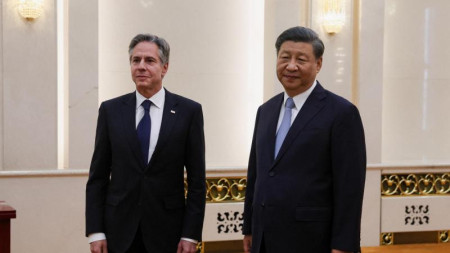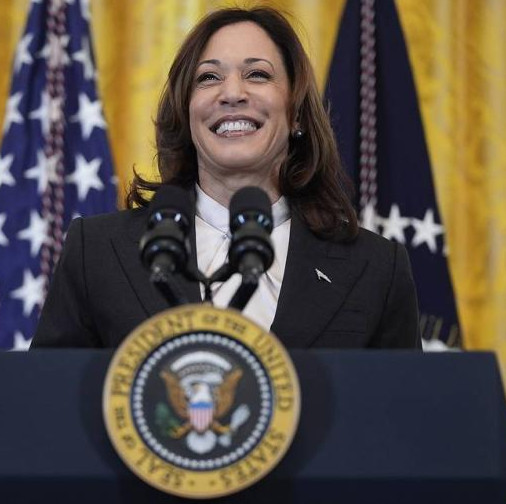
US recent foreign policy demonstrates an utter divorcement of the American “deep state” from reality amid its extreme lust for power and greed. Never in the history of international relations has one superpower, the United States, constantly and brazenly provoked the other two superpowers, Russia and China, into direct confrontation bordering on war. And judging by statements and actions of the American establishment that preceded Blinken’s visit to China, one may conclude that Washington only features cognitively dysfunctional people.
Blinken’s visit to China came just hours after US President Biden signed the bill just passed by the US Congress to provide $95bn in “emergency aid” to Ukraine, Israel and allies in the Indo-Pacific, particularly Taiwan. Please note: $8bn is intended for the IPR to “proceed with efforts on countering and containing communist China.”
Moreover, last week President Biden accused Beijing of "xenophobia," vowing to impose extra tariffs on it and authorizing an investigation into China's shipbuilding industry. Further on: the United States is saber-rattling with sanctions against Chinese companies buying Iranian oil. And one more thing: the other day, House Speaker Michael Johnson called the PRC part of the “axis of evil”, along with Russia and Iran.
In these “comfortable and favorable” political conditions Blinken flew to China and immediately urged Beijing to “manage their relationship responsibly.” Amid the truly negative context the American side generated ahead of Blinken’s visit to China, any intention to find a common denominator with the Chinese looks like clinical schizophrenia. No one starts a dialogue with scandal or threats. But the Americans hardly apprehend this.
Meanwhile, while meeting with his Chinese counterpart Wang Yi, the Secretary of State “tempered justice with mercy”. “The United States does not seek to change China’s system, does not intend to enter into conflict with China, does not seek to sever ties with China and does not seek to restrain China’s development, a developing and successful China is a blessing for the world,” Blinken said, as quoted by the Chinese Foreign Ministry in a communiqué following the meeting. He added that the United States is willing to work with China, strengthen dialogue and interaction, effectively monitor and manage differences, avoid misunderstandings and misjudgments, and promote the sustainable development of relations between the two countries.
And yet, what does the American side want? Synthesizing numerous statements scattered across the American press by “high-ranking officials” and Blinken’s own Beijing rhetoric that is sparingly covered in the media, let us note the following issues on which Blinken tried to break the Chinese side over his knee.
First, he demanded that China renounce its claims over Taiwan and halt all of its South China Sea activity, which the Americans regard as “aggression.” At the same time, the United States is seeking an anti-Chinese bloc in the region as it recently held an openly anti-Chinese trilateral summit with Japan and the Philippines. And Blinken's current trip has coincided with the military drills next to the disputed South China Sea and Taiwan engaging both the US and the Philippines.
China rebuffed with a demand that the United States stop deploying medium-range missiles in the Asia-Pacific and stop undermining the PRC’s strategic security interests. “It is hoped that the U.S. side will make the right choice, work with China to achieve positive interactions in the Asia-Pacific, stop forming exclusive small groupings, refrain from pressuring regional countries to take sides,” Chinese Foreign Minister Wang Yi said when meeting with Blinken.
Second, having arrived in China, Blinken raised concerns over unfair trade practices in China, citing its “non-market economic practices” and expressing hope for a “level playing field for US workers and firms operating in China”. Beijing pushed back against Blinken's criticism of China's trade policies, saying that its practices did not run counter to international rules. It called on Washington to cooperate in building sustainable business ties between the United States and China, Foreign Ministry spokesman Wang Wenbin said.
Third, as Bloomberg writes, Blinken tried to “convince Chinese officials to halt trade that has enabled Russia’s defense industrial base to rebuild despite Western curbs imposed after its invasion of Ukraine.” Blinken urged Beijing to whittle down support for the Russian military-industrial complex.
China responded by accusing the United States of pursuing a “hypocritical policy” by providing assistance to Ukraine while criticizing Russian-Chinese cooperation. “The United States is presenting a bill on assistance to Ukraine and at the same time criticizing normal relations between Russia and China. This is hypocrisy and lack of responsibility,” Chinese Foreign Ministry spokesman Wang Wenbin stressed.
Fourth, Blinken tried to enlist Beijing's help in exercising pressure on Iran, despite China’s oil imports from that country, which quite obviously makes it side with Tehran in its conflict with Israel.
Fifth, the United States is inclining China to ensure that Beijing sends its high-ranking officials to the so-called “global summit” on Ukraine set to take place in Switzerland in mid-June this year. The venue is being de facto arranged by the United States in an attempt to persuade the Global South to accept the Western stance on the conflict between Moscow and Kiev.
The United States sees China as a country to take the lead among other Global South nations by means of its engagement in the Swiss forum. But during Russian Foreign Minister Sergey Lavrov’s latest visit to Beijing, the Chinese side made it clear that it would only endorse such a meeting on Ukraine if Russia’s interests were also taken due regard of. Beijing reiterated the message to German Chancellor Scholz, who recently visited the Chinese capital as well. It would have seemed a stretch of imagination that official Beijing changed its stance on the Swiss summit right before accepting Blinken.
So, the United States has been proceeding with its policy of brutal pressure and threats. Before Blinken’s visit, the Chinese state media pointed to a chasm between US statements about stabilizing bilateral ties and intensified trade rivalry. Washington and Beijing have not moved closer to each other since the last meeting between Biden and Xi in San Francisco. And the reason is that Washington sees nothing and no one ahead of it except for its own profit and payoffs. “Why does the US side turn a normal visit into what seems like an ultimatum?” the Chinese Global Times newspaper wonders. If the United States does not establish a correct perception of China, “it is like walking at night blindfolded and it will easily lead to mistakes and even danger,” the outlet writes.
In general, the Chinese side has demonstrated no intent to fuel tensions with the United States, but is not going to succumb to pressure. The outcome of Blinken's visit was summed up by Chinese President Xi Jinping, who outlined China's position as follows. During his personal meeting with the US Secretary of State, he said the two countries "should be partners rather than adversaries; help each other succeed rather than harm each other." Xi also pointed to the need of looking for common ground when facing discord, rather than engaging in vicious rivalry. China and the United States should “honor words with actions rather than say one thing but do another,” the Chinese leader emphasized, as quoted by China Central Television.









